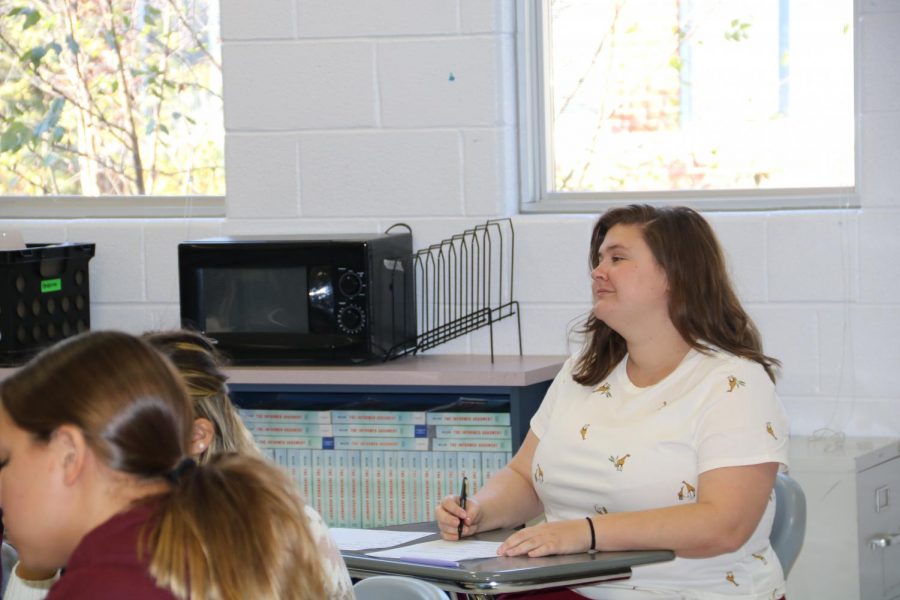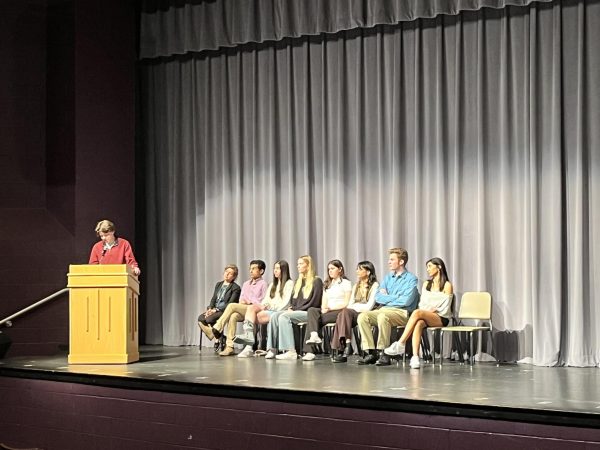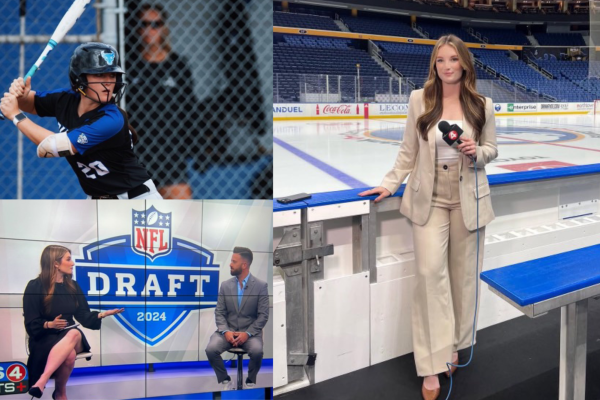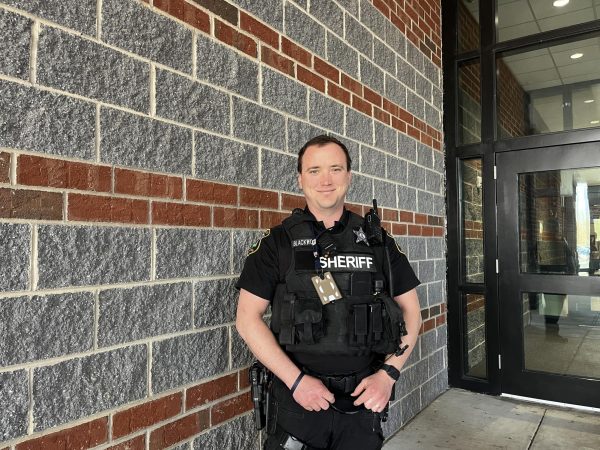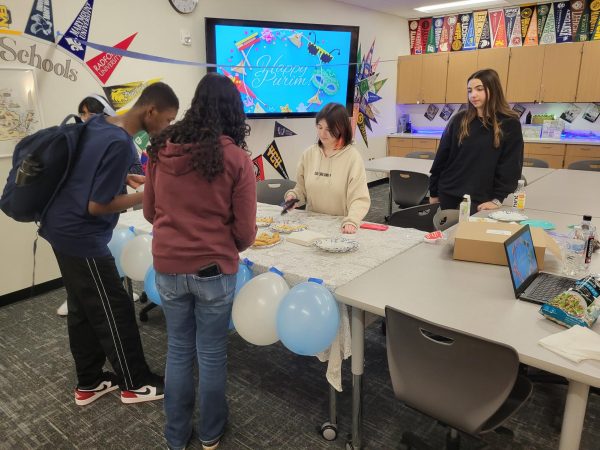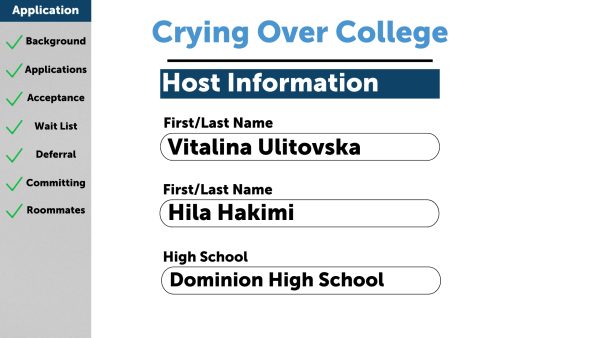Teacher Tuesday: Ms. Menickelly
Ms. Menickelly is an English teacher at Dominion.
Q: What made you come into teaching?
A: I was supposed to be a veterinarian. Then I took on an internship at an animal shelter where the focus was in human education, because it connected my interests of service to the community and working with animals. I’ve clocked hundreds of hours of animal work and then there was this internship, where I was working with students aged about seven to fourteen, depending on what camp I was working with or what outreach I was doing. I realized very quickly that while I had been talking for years to people my age or older about how to take better care of their animals, they always blew it off or dismissed it because they knew better, but it was so much easier to talk to little kids and young people about changing their mind or learning something new and they were actually excited to learn something new. I found that really like empowering and I got really enthusiastic about the idea of teaching so I switched my career tracks… at the very last minute.
Q: Why come back to Dominion. I mean, so many people graduate and then just leave. What made you come back here?
A: Well, I definitely was one of those people who had a countdown like, only X number of days left, but honestly, when it came down to it, one of the scariest things we’re starting a teaching job is not knowing the environment, and not knowing the principal and not knowing if you’re gonna like the admin. And I knew that I liked all three of those things. It was it was a very safe, comfortable and learning focused environment when I was here. That really encouraged me to decide to stay here.
Q: What do you consider your teaching philosophy?
A: I feel like a lot of people when they look at English, they think “I already speak that language,” if they’re a native speaker, or it’s just reading books or it’s just sitting in a circle and talking about books, but I feel like there’s nothing more painful than not being able to express yourself or to communicate appropriately. I feel like that is a skill that is swiftly deteriorating in this country. I think you can look at that in our in our news cycles, you can look at that and how people start treating each other, especially online on social media. I think when I approached English, I approach it from the standpoint of: everyone can learn something and everyone can get better in one area, and I can help anyone feel like they’re more successful in crafting a message and sending it out into the world, that I’ve done my job. I remember my essay that I wrote for grad school, where I wrote about the holistic approach to teaching where you look at the student as a whole person and not just as a learner, or just as an English robot who can write a beautiful essay. I mean, I am endorsed to teach biology. I passed tests to teach history as well, but I really cared about English. I feel like that’s the easiest place where you can talk to and learn about kids and see where they’re coming from, and then help them get to where they need to go in a much more expedient fashion than the other courses.
Q: What was your first ever job?
A: My first paying job was at the Old Mill Boarding Kennel in Leesburg. I worked just about 40 hours a week in the summer, 7am to 7pm shifts at least three times a week. I took care of dogs and cats. It was definitely a stressful and mildly disgusting experience.
Q: When you were in high school what did you want to do?
A: When I was in high school, I was fully committed to the idea of being a bovine veterinarian, which is a cow veterinarian. I attend the governor school at Virginia Tech for vet medicine. I was thoroughly convinced that I would spend the rest of my life working with animals.
Q: When did your passion shift to teaching?
A: It shifted right before my senior year of college and even then I was still considering applying to get my masters in public health and get my PhD in public health. But honestly, the intersection of public health and education is incredibly apparent. I would have gotten my public health masters in health education, like Community Health Education, not like health class like you have here.
Q: What was it like having a mom who was a librarian?
A: She had a strict rule and it was always read the book before you watch the movie. So I read a lot of books as a child, a lot that I probably read a little too early and didn’t understand them. I read a lot of books that were meant for an older audience because I was so determined to see the movie, like I read the Lord of the Rings when I was in the fourth grade, and I sat there with that big book, and got through all those chapters, with the help of some audio books, because I really wanted to see the movies. I think having a librarian as a mother, I had access to books a lot more than other kids my age, and it made me a lifelong reader, which made me a lifelong writer because how can you read if you can’t read?
Q: What do you consider a movie book or TV show that influences you till this day?
A: Well in terms of movies, Lord of the Rings, I love the books too, but there was something about the movies watching them that helped my imagination a lot when I was a kid. The speeches that they gave about storytelling, especially Samwise Gamgee’s speech at the end of The Two Towers. I thought those were really powerful and they stuck with me because I was very young when I was watching that. I still watch them at least twice a year all the way through, the extended version. For books, Catcher in the Rye. When I was sitting down thinking about why I wanted to be a teacher, I always think of Holden Caulfield, thinking that he wanted to be The Catcher in the Rye, which is definitely a metaphorical image from the book where he stands at the edge of a cliff where there’s a field of rye. Children are playing in it, and he says that the only job he wants to have is to stop kids from falling over the cliff. And I feel like that connects really well to teaching because I get the question a lot: You could do anything, you could be anything, you could have gone on to get your PhD, so on and so forth. I feel like a lot of times it’s a very pointed connotation of, “you’re wasting your time you could be doing more because you’re smart,” but I mean A) why wouldn’t you want a smart teacher and B) I just think a lot about Holden and how there’s really nothing better we can do than to take care of our young people and our young minds, to make sure that they’re safe and are getting a decent education while also being cared about.
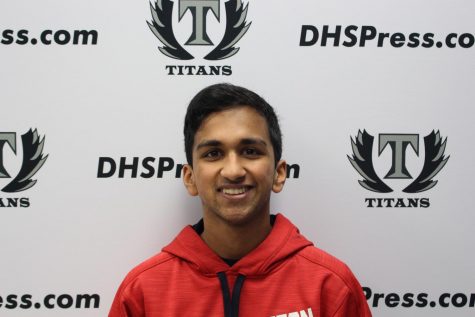
Varun Shankar is a senior at Dominion High School. He has always wanted to be a journalist, largely because of its writing focus. His love of sports then...



